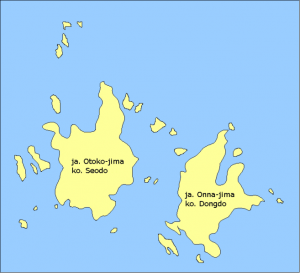
The Dokdo/Takeshima islet, nestled between Japan and South Korea, have long been the source of unprecedented tension between the two countries.
Last week, South Korean President Lee Myung-bak visited a group of rocks that feebly boasts only two occupants. And yet, this visit prompted a rising in tensions between the two Northeast Asian economic powers that turned heads worldwide. What is it about these rocks that is so important and why are U.S. experts calling the tension they cause in the region “worrying?”
The Liancourt Rocks – referred to as Takeshima (たけしま/竹島) in Japan and Dokdo (독도) in Korea – are a grouping of two islets consisting of 35 rocks in the Sea of Japan (East Sea). Both countries claim the small islets, which are worthless on their own, but vital when one considers the vital fishing waters and terroritial significance the rocks carry.
Only two Koreans citizens, a husband and wife fishing team, actually live on the rocks themselves. In addition, 37 South Korean police guard the islets and South Korean schoolchildren often travel to the area on fieldtrips. The rocks are barely habitable, but the area around the rocks provides an Exclusive Economic Zone (EEZ) with access to a wide range of fish and sealife. The South Koreans have formally administered the islets for decades.
Lee’s visit itself – the first ever by a Korean president to the islets – gained worldwide attention after Japan recalled its ambassador in Seoul after the South Korean leader returned home last week. American experts and Asia watchers are now worried the increased tensions could spill over into the U.S.’s “pivot to Asia” plans.
“The visit will serve as a negative influence on ROK-Japan relations,” Council for Foreign Relations Director of the Program on U.S.-Korea Policy Scott Snyder told me.
“Arguably, ROK and Japanese strategic interests converge when one considers the regional context, but there are obviously deep constraints on the development of a forward-looking relationship,” he added, saying, “Hopefully, these constraints will be managed well and will not become an overwhelming obstacle to continued Japan-ROK cooperation.
Just as they do in the U.S., foreign policy steps taken today are most likely political maneuvers meant to bolster the leader’s strength before national elections, CFR’s Senior Fellow for Japan Studies Sheila Smith also told me.
“It is disappointing that President Lee felt it necessary to highlight the territorial dispute with Japan. The two nations are already having difficulties, and this further accentuates populist nationalisms in both countries. The year end electoral dynamics in South Korea undoubtedly have a role to play in the President’s calculations,” Smith said.
And tensions show no signs of abating. On Tuesday, President Lee quashed hope the visit could be pushed under the rug after remarks he made on the eve of the annual commemoration of Korean independence further inflamed Japanese ire.
“Japan does not understand the position of a victim and an assailant,” Lee said Tuesday, after being asked a unrelated question on school violence by a teacher. “If the Japanese emperor would want to visit Korea, it would be good if he pays tribute and sincerely apologizes to those who died in fighting for liberation.”
The Japanese Foreign Ministry did not quite know what to make of the remarks, it said, saying no visit by the emperor to the islets was in discussion. Also on Tuesday, a planned meeting between the two countries’ finance ministers slated for next week was cancelled by the Japanese side, although South Korea said the issue of the islets was not the impetus.
Rumors also abound in the Japanese press that a bilateral meeting scheduled for next month might also be cancelled, with the Japanese discussing responding to Lee’s remarks by taking the issue to the Interational Court of Justice.
“The situation worries me,” Michael Green, Japan Chair for the Washington-based think tank the Center for Strategic and International Studies, told me. “It does seem overdone given the stakes,” he added.
Meanwhile, the U.S., which has been openly shifting military and diplomatic resources to the Pacific for months, hoped to steer clear of choosing sides in the dispute.
“We continue to say the same thing to both sides, that we don’t take a position on this ourselves,” State Department Spokesman Victoria Nuland told reporters Monday. “We want to see them work it out through dialogue. That remains our public and our private message.”